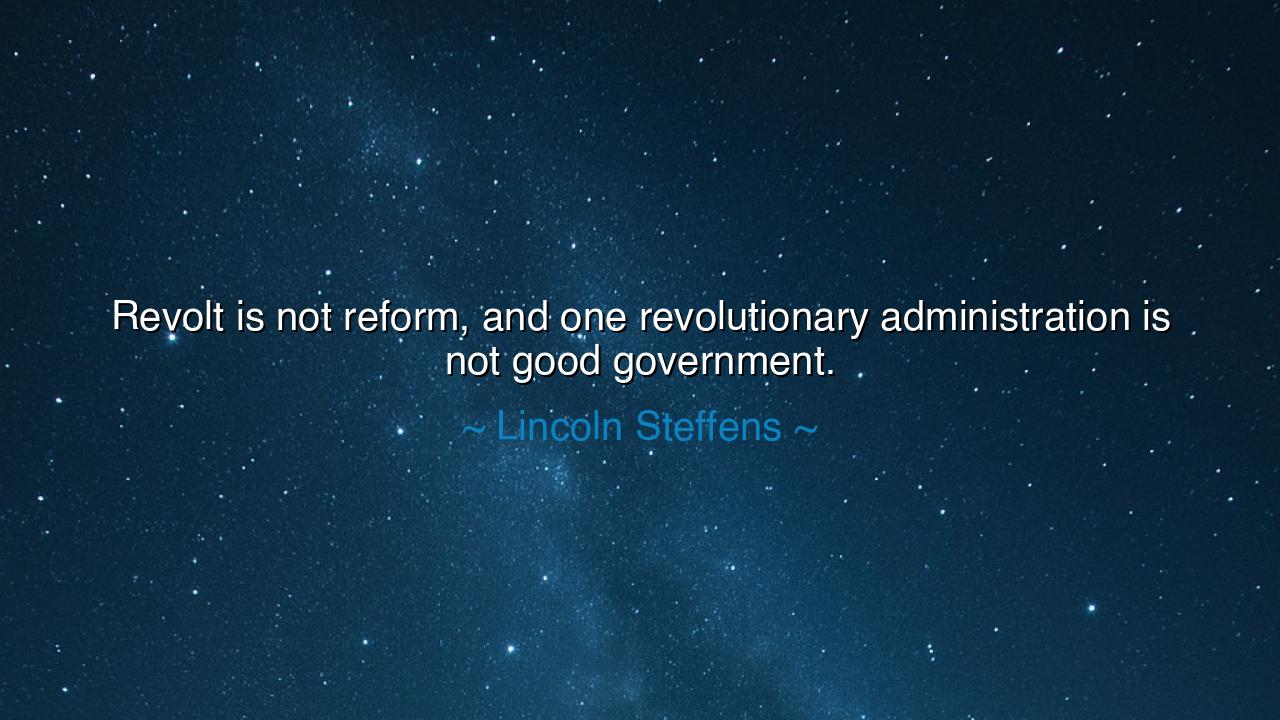
Revolt is not reform, and one revolutionary administration is not






Hear, O children of history and discernment, and listen to the words of Lincoln Steffens, who declared: “Revolt is not reform, and one revolutionary administration is not good government.” In these words lies a wisdom forged from the fires of upheaval and disillusionment. Steffens, who walked among the powerful and the poor during the turbulent dawn of the twentieth century, spoke not as an enemy of change, but as a student of its dangers. He had seen revolutions born in passion and die in corruption, and he sought to remind mankind that destruction is easier than renewal, and rebellion is not the same as righteousness.
Lincoln Steffens was a journalist—a muckraker, as they were called—who exposed the corruption festering in American cities at the turn of the century. His eyes had seen the greed of politicians and the complacency of the governed. Yet he was no cynic. He longed for reform—true reform, rooted in justice and sustained by principle. He witnessed movements rise like tempests, shouting of liberty and equality, only to collapse into chaos, greed, or tyranny. From these experiences came his insight: that revolt may tear down the walls of oppression, but only reform, guided by wisdom and patience, can build a lasting house of freedom.
His words recall an ancient truth. The history of nations is filled with moments when righteous fury consumed injustice, yet left only ashes behind. Consider the French Revolution—a revolt against monarchy and privilege, born of noble ideals. But the storm of anger that overthrew kings soon devoured itself in blood. The guillotine became its god, and one revolutionary administration after another rose, each promising virtue, each consumed by vengeance. From that chaos emerged not liberty, but Napoleon, who crowned himself emperor. The people had revolted, yes—but they had not reformed. The lesson is clear: to overthrow is not to govern, and passion without principle breeds only new chains.
Steffens, though American, looked upon these lessons as universal. In his own time, he traveled to Soviet Russia after its revolution, filled with curiosity and hope. He saw a people who had toppled an empire, only to fall under the weight of authoritarian control once again. His conclusion was not born of ideology, but observation: the transformation of society requires more than the changing of rulers—it requires the transformation of hearts. For a government is only as just as the conscience of its people, and when rebellion lacks moral foundation, tyranny merely changes its name.
And yet, his words are not a condemnation of courage. Steffens does not scorn revolt when it is necessary. There are times when evil must be resisted, when silence is complicity, and when revolution is the cry of the enslaved heart. But he warns that rebellion must never be the final aim—it must be the beginning of reform. The sword can shatter the old order, but only the plow can cultivate the new. True reform demands patience, education, and the humility to govern wisely after victory.
From this wisdom, let every generation learn. When you see corruption, do not be content with mere outrage. When you demand justice, do not let anger blind you to the discipline required to build it. Revolt without reform is like fire without fuel—it burns brightly for a moment, then fades into smoke. It is not enough to remove the unworthy; one must replace them with the worthy, and then hold them accountable, lest they too fall into the same corruption.
Practical wisdom flows from Steffens’s reflection: seek justice through order, not chaos; demand change through structure, not destruction. Support movements that are principled, not merely passionate. Study the lessons of history, so that reform may be guided by foresight, not vengeance. And when you labor for change, remember that true victory is not the fall of the old regime—it is the rise of a better one.
Thus, Steffens’s words endure as both warning and torch: “Revolt is not reform.” Passion may open the gates of history, but only wisdom can build what lies beyond them. Let all who yearn for justice remember this—that to destroy is human, but to rebuild with virtue is divine.






AAdministratorAdministrator
Welcome, honored guests. Please leave a comment, we will respond soon